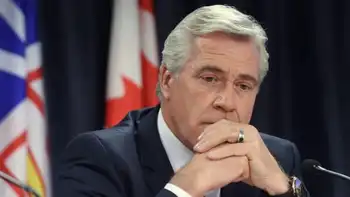Seattle Capitol Hill Apartment Fire highlights an electrical fire from an overheated power strip, a two-alarm response by 70 firefighters, safe evacuation, displaced resident aid, and prevention tips like smoke detectors and load limits.
Key Points
Two-alarm early-morning blaze in Seattle traced to an overheated power strip, displacing one resident and injuring none.
✅ Origin: overheated power strip ignited nearby combustibles
✅ Response: 70 firefighters, two-alarm, rapid containment
✅ Safety: avoid overloads; inspect cords; use smoke detectors
An early-morning fire in Seattle’s Capitol Hill neighborhood severely damaged a three-story apartment building, displacing one resident. The blaze, which broke out around 4:34 a.m. on a Friday, drew more than 70 firefighters to the scene, as other critical sectors have implemented on-site staffing during outbreaks to maintain operations, and was later traced to an overheated power strip.
The Fire Incident
The Seattle Fire Department responded to the fire, which had started on the second floor of the building in the 1800 block of 12th Avenue. Upon arrival, crews were met with heavy smoke and flames coming from one unit. The fire quickly spread to a unit on the third floor, prompting the Seattle Fire Department to escalate their response to a two-alarm fire due to its size and the potential threat to nearby structures.
Firefighters initially attempted to contain the blaze from the exterior before they moved inside the building to fully extinguish the fire. Thankfully, the fire was contained to the two affected units, preventing the destruction of the remaining seven apartments in the building.
All residents safely evacuated the building on their own. Despite the substantial damage to the two apartments, no injuries were reported. One resident was displaced by the fire and was assisted by the Red Cross in finding temporary accommodation.
Cause of the Fire
Investigators later determined that the fire was accidental, most likely caused by an overheated electrical power strip. The power strip had reportedly ignited nearby combustible materials, sparking the flames that quickly spread throughout the unit. Although the exact details are still under investigation, the fire serves as a stark reminder of the potential risks associated with overloaded or damaged electrical equipment and how electrical safety knowledge gaps can contribute to incidents.
The Risks of Power Strips
Power strips, while essential for providing multiple outlets, can pose a serious fire hazard if used improperly, and specialized arc flash training in Vancouver underscores the importance of understanding electrical hazards across settings.
This fire in Seattle highlights the importance of maintaining electrical devices and following proper usage guidelines. According to experts, it is crucial to regularly inspect power strips for any visible damage, such as frayed cords or scorch marks, and to replace them if necessary. It's also advisable to avoid using power strips with high-power appliances like space heaters, microwaves, or refrigerators.
Impact and Community Response
The fire has raised awareness about the dangers of electrical hazards in residential buildings, especially in older apartment complexes where wiring systems may not be up to modern standards. Local authorities and fire safety experts are urging residents to review safety guidelines and ensure that their living spaces are free from potential fire hazards and to avoid dangerous stunts at dams and towers that can lead to serious injuries.
Seattle's fire department, which responded to this incident, continues to emphasize fire prevention and safety education. This event also highlights the importance of having working smoke detectors and clear escape routes in apartment buildings, and ongoing fire alarm training can improve system reliability. The Seattle Fire Department recommends that all tenants know the locations of fire exits and practice safe evacuation procedures, especially in high-rise or multi-unit buildings.
Additionally, the Red Cross has stepped in to assist the displaced resident. The organization provides temporary shelter, food, and financial aid for those affected by disasters like fires. The fire underscores the importance of having emergency preparedness plans in place and the need for immediate relief for those who lose their homes in such incidents.
The Seattle apartment fire, which displaced one resident and caused significant damage to two units, serves as a reminder of the potential dangers associated with improperly maintained or overloaded electrical devices, especially power strips, and how industry recognition, such as a utility safety award, reinforces best practices. While the cause of this fire was linked to an overheated power strip, it could have easily been prevented with regular inspections and safer practices.
As fire departments continue to respond to similar incidents, it is critical for residents to stay informed about fire safety, particularly regarding electrical equipment and outdoor hazards like safety near downed power lines in storm conditions. Awareness, proper maintenance, and following safety protocols can significantly reduce the risk of electrical fires and help protect residents from harm.
Related News












